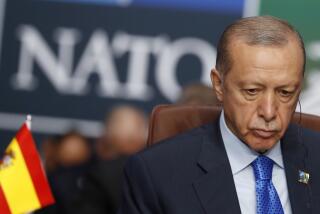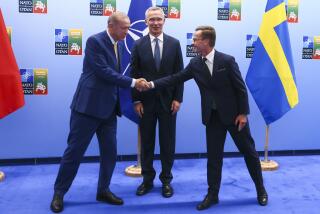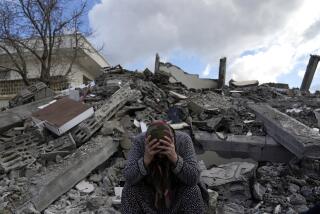Turkish Demand Risks Impeding War Strategy
- Share via
ANKARA, Turkey — The Bush administration’s plans to open a northern front in a war against Iraq appeared in jeopardy Tuesday after the Turkish government said it won’t seek a parliamentary vote allowing U.S. troops in the country unless Washington greatly increases the size of a proposed aid package.
Facing strong resistance at home to a war, Turkish officials said they need far more than the $6 billion in grants and $20 billion in loans that the U.S. has offered before they will seek legislative approval for the troop movement.
President Bush and other top officials, who were expecting a final go-ahead from the Turks on Tuesday, instead were left fuming about the latest demands and weighing how to respond.
In Ankara, the Turkish capital, a senior Western official close to the talks said: “This is it -- it could all be over.... Relations between Turkey and the United States are basically heading south.”
The Western official insisted that the postponement of the parliamentary vote was an effort by the Turks to get the Bush administration to drop its plan to funnel troops through the country.
“The objective is to make the U.S. give up on the idea of a northern front,” he said.
That front has been key to Pentagon war plans. A threat from the north would compel Iraqi President Saddam Hussein to divide and weaken his forces, easing the way for a larger U.S. force coming from Kuwait and potentially hastening the end of a war.
Thousands of U.S. troops are already heading to Turkey on Navy ships.
But one senior U.S. official said the Bush administration would not come up with the huge “fake numbers” that the Turks are demanding to cover the costs they could incur in a war. Instead, he said, U.S. officials would argue that the Turks stand to gain greatly from the removal of Hussein’s regime and would “remind them of their responsibilities as a member” of the North Atlantic Treaty Organization.
This official said the United States views the Turkish move as a tactic to win a better deal and still believes that the Turks will offer the proposal soon for a parliamentary vote.
Another U.S. official said this latest delay may cause some rethinking of the assumption that the Turkish foot-dragging was a negotiating tactic.
Pentagon officials have said that a Turkish refusal would not be a “showstopper” with regard to the effort to develop a northern front. Instead, the U.S. military may fly forces into Kurdish airfields in northern Iraq and work with Kurdish forces to jointly attack Hussein’s armies in the north.
But the United States would have to be content with a smaller force if it took that approach. It might have only 10,000 to 20,000 U.S. troops, compared with 40,000 if Turkey was involved, analysts say.
If the U.S.-Turkish deal collapses, it could damage military and economic relations between the United States and one of its strongest allies in the region. A failure could hurt Turkey’s frail economy, which is dependent on American aid and loans from the U.S.-influenced International Monetary Fund. A rupture would also strengthen the hand of Kurdish forces in the prosecution and aftermath of the war. Turkey, which has faced a Kurdish insurrection of its own, fears that the Kurds who control northern Iraq would want to establish an independent state if Hussein was ousted.
According to Turkish media reports, another sticking point in U.S.-Turkish talks is the role that Turkey’s armed forces would play in northern Iraq and whose command they would fall under.
The United States has recently reached an agreement with Turkey to allow Turkish troops inside Kurdish-controlled areas of northern Iraq. Iraqi Kurdish leaders, who are strongly opposed to a Turkish military presence, are demanding that those troops be led by a U.S. commander, a demand that Turkey has squarely rejected. A senior Turkish official involved in the negotiations said that another key demand being pushed by Turkey’s powerful military leaders was that the United States guarantee in writing that it would not support the establishment of an independent Kurdish state in northern Iraq.
Administration officials have warned their Turkish counterparts in recent weeks that a failure to cooperate in an Iraq war could damage the relationship between the two nations.
“Next time Turkey knocks on Congress’ door for help, they’ll be asking them where they were when the U.S. asked for Turkey’s help,” said the Western official in Ankara. “The answer Turkey will likely get is a very loud and firm no.”
Polls here consistently show, however, that nine out of 10 Turks oppose taking part in another war against Iraq.
Facing down public opinion, Turkey’s ruling Justice and Development Party has already taken steps toward committing itself on the side of the United States. Last month, the Turkish parliament voted to allow U.S. military technicians to upgrade Turkish bases and ports for possible use in a war.
But on Tuesday, Recep Tayyip Erdogan, the Justice and Development Party chairman, said that vote did not constitute an irreversible commitment to a war.
“Turkey is a serious state that makes its own decisions,” he told parliament. “This is not a nation ruled by tribes.”
*
Special correspondent Zaman reported from Ankara and Times staff writer Richter reported from Washington.
More to Read
Sign up for Essential California
The most important California stories and recommendations in your inbox every morning.
You may occasionally receive promotional content from the Los Angeles Times.











